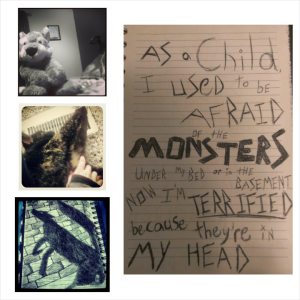Recently, as I have been working on my college capstone paper of [Adolescent] Self-Injury, Blood in the Scripture Narrative, and the Church, I have been thinking a lot about the awareness of self-harm and how it is so often an issue swept under the rug or flat-out misunderstood when it is addressed.
As a result, self-injury is mishandled in regards to individual needs within the body of Christ. This saddens me very deeply. It is from some of the research that I have done for this particular paper that this post has been formed. It is through a sense of urgency for change within the church and a personal passion for healing and understanding towards self-harm that I write these thoughts.
It’s March 1, and today you’ll find me wearing orange in support of self-injury recovery and spreading awareness for the issue.
Christians can experience intense emotional pain and express it outwardly in self-injurious behavior, just like anyone else! The problem of self-injury in the church is the guilt and shame that is lavished towards the hurting and broken. The messages they hear contradict what they are taught in Jesus. What is misunderstood is that self-harm is a form of communication, and so people who feel they have no other outlet are shunned and shamed, condemned and judged.
But, dear Church.…
Where is grace? Where is love?
… … … Freedom? Healing?
WHY are we not being the hands and feet of Jesus towards our own people? Our fear is unacceptable. We might be more willing to reach out to a non-believing self-injuring person because they “don’t know Jesus” and obviously that’s why they hurt themselves. Well, no. That’s wrong. People are not some project to be fixed, regardless of faith or what they might believe. Self-injury has little or nothing to do with faith beliefs alone; rather, it has everything to do about the belief of self. In the way self-injury is looked down upon, the church solidifies the very core negative self-beliefs that someone might believe.
In Armando Favazza’s Bodies Under Siege, he gives these common maladaptive thoughts about self-harm: “It is acceptable because it always provides quick relief; it doesn’t hurt anyone but me; It’s my friend; It’s my way of communicating what I feel inside; I deserve to be punished; I’m unlovable, a bad person, and a loser in life; It keeps people away; My body is my enemy; I’m ugly and my body is disgusting; I can’t stop cutting myself; I’m addicted to cutting; It’s what keeps me from killing myself” (p. 259).
So the church’s response to self-harm ought to be in an understanding grace. On some level, we know what it feels like to just feel inadequate. Yet, that’s not the typical response as far as I’ve seen it. It’s upsetting and disappointing.
“Oh, you hurt yourself? You must not love God enough.
Did you realize that as a Christian you are the temple of the Holy Spirit? How do you feel about that?”
I could scream. Oh my God, I could scream. In fact, I have raged over this one before. PLEASE tell me I’m not the only one who becomes infuriated at such a response towards self-harm. Sadly, it’s a typical one that I’ve seen in the church. If you would just love God more, you could be free from your self-injurious behavior. You’re God’s holy temple for the Spirit who lives inside you. Let’s take Scripture completely out of context for that particular one. Mkay. And if you’re struggling with self-injury the thought that comes to mind might be something like this: “As though that changes the internal pain that seems to be crawling through my very veins. Riiiight. Are you living in reality? I am in pain; don’t you see that?!”
Something has got to change. We need to empower the hurting rather than tear them down. We’ve got to encourage them to seek help and put the brakes on our own emotions for their sake. As the church, the body of Christ, let’s be the change! Let it begin with ourselves and within ourselves. Let’s bring hope to the brokenness around us and light up darkened paths. It might do us good to look at the Biblical narrative to see how blood and bloodshed are handled throughout Scripture and see for ourselves how blood is the source of life used in the atonement for sins, and in Christ, our healing.
Perhaps we could back up and see in some way the one who self-injures actually understands the power of Christ’s atonement for sins at a greater level through their personal bloodshed. They have felt and seen the “healing” that comes in the form of blood. Through their own experience, they have seen for themselves what Christ has done for them and know that blood does bring about a sense of healing. With this knowledge they can know that they do not need to continue harming themselves.
This is the good news for them! They have the ability through their own pain to reconcile with the fact that Christ’s blood has been shed so they do not have to further hurt themselves! But we ought to be conscientious towards them in love and care and encourage them to seek treatment. Their story can become a testimony to the power of blood and what Christ has done, all the more. We can give them some credit and empower them in this knowledge!
I am biased, of course, and a lot of what I write is from my own personal experience. I am a young woman recovering from my own journey of self-injury. And that example given towards the beginning? Yeah, that’s been used on me before. And all it did was serve to piss me off and make me more self-loathing as I tried to justify and understand what I was experiencing and acting upon. Why can I not just stop this and be better for God’s sake? Why can’t I fix this? I’m in pain! I deserve this. I need this. They don’t understand. What is wrong with me? …I must be broken… I can stop at any time. It’s not that bad… I can’t live without it. My emotions and thoughts were confusing, scattered, and painful when I paused to reflect upon them.
I was seen in a one-dimensional sort of way;
I was a cutter.
My self-injurious behavior became my identity.
As I’ve heard it said, “hurting people hurt people.” You could say that again. I was so angry that nothing seemed to be changing. I just couldn’t persist my way through it, no matter how hard I tried. I was afraid of being weak or seen as such, and afraid of somehow hurting someone else, and in my frustration I became passive-aggressive. I needed help that went beyond just the spiritual and my faith. After all, this was an issue that penetrated not only my faith, but my emotions, my self-beliefs, and my physical self. It encompassed all of me. As such, I needed to find healing in the form of wholeness.
And so, if you struggle with self-harm, I urge you to seek help. Not tomorrow, not the next time you hurt yourself or even feel the urge to hurt yourself. Talk to someone. Do it as soon as possible. Find a counselor, a safe person; seek treatment in therapy. If you’ve never sought this before, you might feel the itching fear rising up inside. Fight for you. Believe you are worth it. If you’ve relapsed during recovery, you may feel a similar fear; don’t give up. Keep fighting for you.
You are not alone in this struggle. Keep fighting for the story you live. It’s worth it.
Remember, you are loved. You are not a “cutter” or a “burner” or whatever label self-injury has given you. That is not the sum of who you are. My favorite quote from the book Cutting by Steven Levenkron is simply this: “A victim’s illness is not her identity” (p. 63). Believe this is true. You are so much more than this. You can overcome this. It is not by mere persistence alone that you’ll get there. Lean into people, allow them to help you. Seek help. Keep trying, keep going. This thing didn’t happen to appear overnight, and as such it’s going to take time to get free. Be patiently persistent. But never give up; your story matters.
If you’ve tracked with me through this whole post, thank you! Please take the time today to care for those that are hurting; your encouragement, love, hope, and acceptance might help spur them forward to the changes they want to see for themselves, but are unable to reach on their own. People need you, perhaps more than you know. Be available.
Be aware of the fact that whether or not you know it, someone in your life might be struggling with self-harm. Above all, know that the blood of Jesus covers them just as it covers us. Don’t be reactive out of fear or anger, but be proactive in love.
Recovery is just one portion in the journey of life. We can walk through it together.
– – – – –
Interested in additional resources?
The following pyramid of links are websites that have fueled a portion of my research or spurred my personal recovery from self-injurious behavior. I hope they serve to bring more understanding to your research or recovery!
LifeSigns
Self-Injury Foundation
S.A.F.E. – Self-Abuse Finally Ends
TWLOHA – To Write Love on Her Arms
Cornell Research Program on Self-Injurious Behavior
Grace and peace to you,
Kady

